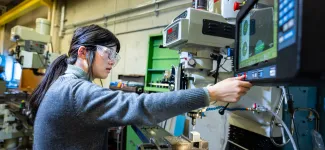
The manufacturing sector is a cornerstone of the British Columbia economy, contributing approximately $18 billion annually and accounting for over 6% of the province's GDP.
With nearly 20,000 manufacturing businesses, many with decades-long legacies of excellence and international reach, the sector sustains approximately 170,000 jobs. BC’s Labour Market Outlook projects over 50,000 new job openings in manufacturing over the next decade.
Manufacturing engineers play a crucial role in driving innovation and efficiency across various industries. As technology advances, the demand for skilled manufacturing engineers continues to rise, making this a dynamic and rewarding career choice.
Transforming Ideas into Reality
A degree in Manufacturing Engineering from UBC opens the door to a world of opportunities. Our graduates are equipped with the skills and knowledge to excel in various industries, bringing innovative solutions to complex problems. Manufacturing engineering is a multidisciplinary field that combines principles from mechanical, electrical, and industrial engineering to design, analyze, and improve manufacturing systems.
Diverse Career Paths
Graduates of our program find themselves in a variety of roles, leveraging their expertise in numerous sectors:
Automobile and Aerospace: Manufacturing engineers design, produce, and optimize vehicles and aircraft. They develop efficient manufacturing processes, improve product quality, and ensure compliance with safety standards.
Electronics Manufacturing: Engineers in this sector design and implement manufacturing systems for electronic components and devices, ensuring high-quality output and cost-effectiveness.
Clean Energy and Biomedical: In the clean energy sector, engineers work on producing renewable energy systems like solar panels and wind turbines. In the biomedical field, they develop and manufacture medical devices, ensuring they meet health and safety standards.
Research & Development: Engineers in research settings develop new manufacturing technologies and processes. They conduct experiments, analyze data, and work on innovative projects that push the boundaries of manufacturing science.
Government Agencies: Engineers in government roles develop and enforce regulations to ensure the safety, quality, and sustainability of manufacturing practices. They work on policy development, compliance inspections, and industry standards.
Consulting Services: Engineers in consulting provide expert advice to businesses on optimizing manufacturing processes, reducing costs, and improving product quality. They may work on a project basis or as part of a consulting firm.
Build Your Future, One Experience at a Time
Explore the diverse career paths available to Manufacturing Engineering students through our Co-op program. Gain hands-on experience in fields such as aerospace, clean energy, biomedical engineering, and more. Enhance your skills, build your professional network, and pave the way for a successful career.